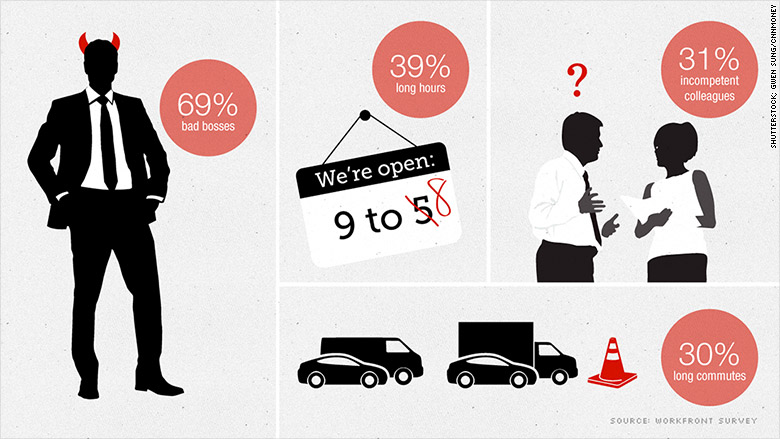
Be honest. How many times have you said this to your 5-year-old: "Hold on a sec, honey, I just have to answer this email from work."
Ever missed an anniversary dinner or spent a day or two of your vacation fielding calls from the office?
While a majority of people say they have at least a somewhat good work-life balance, 89% say it's important for employers and clients not to contact them outside of work.
That's according to a new survey from project-management systems maker Workfront.
Half of participants said that work has intruded on their time spent with family and friends and caused them to miss important life events such as weddings and birthdays. And roughly 40% said it has ruined time spent with family and caused them to lose focus when they were with them.
The negative effects of off-hour interruptions bleed into time at the office, too, most commonly causing bad morale, where employees either resent each other or management, survey participants said. Next comes burnout, high turnover and the death spiral of working longer hours but getting less done.
When those surveyed were asked to list the biggest factors that can harm work-life balance, the leading answer by a mile was "bad bosses" -- defined as "demanding" "overbearing" and "mean."
Tied for second: "constantly" working beyond standard business hours and inflexibility in scheduling work hours and time off.
A not-so-distant third were incompetent colleagues and long commutes.
Related quiz: Do you have a good work-life balance?
So what can employers do to preserve or restore work-life balance? Nearly 70% of survey participants said they should offer flexible work schedules.
More than half said they think employers should offer them the option to work remotely.
And about one quarter of respondents said companies should offer unlimited time off, only allow employees to respond to email during business hours or prohibit meetings during a given period -- say, no meetings on Thursday or no meetings after 3 pm on a Tuesday.
Among the benefits of meeting-free periods: people can plan to get actual work done or make a necessary appointment outside the office without fear that they'll be pulled into a last-minute meeting with the boss.
Related quiz: Are you a workaholic?
Breaking down results by gender, men and women answered similarly on many of the Workfront survey questions. But women were more likely than men to say they had good work-life balance. At the same time, women were also more likely to list burnout as a negative consequence when there's a notable imbalance. And men were more likely to say they've missed important life events as a result of work.
There were a few generational differences, too. More than half of Millennials said it's okay to answer an urgent email during family dinner, while less than a third of Baby Boomers did.
And those under 44 were less likely than their older colleagues to identify ruined time spent with family as one of the most negative consequences of poor work-life balance.
More than 2,000 people took the Workfront survey, of whom 610 people said they had full-time "9-to-5" jobs.
Share your work-life balance horror story. What's the worst example of your job (past or present) bleeding into your home life? Tell us your story and you could be featured in an upcoming story on CNNMoney.
